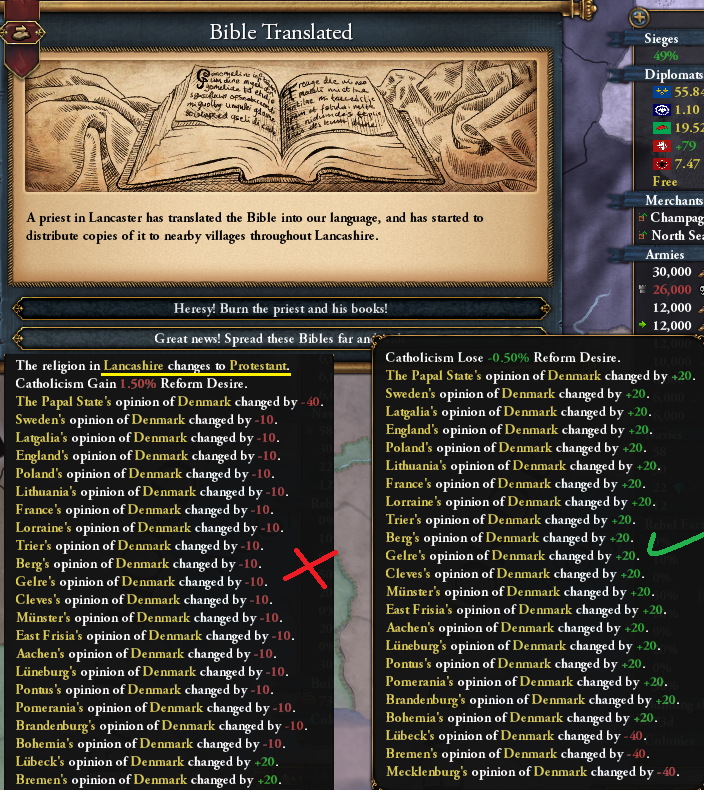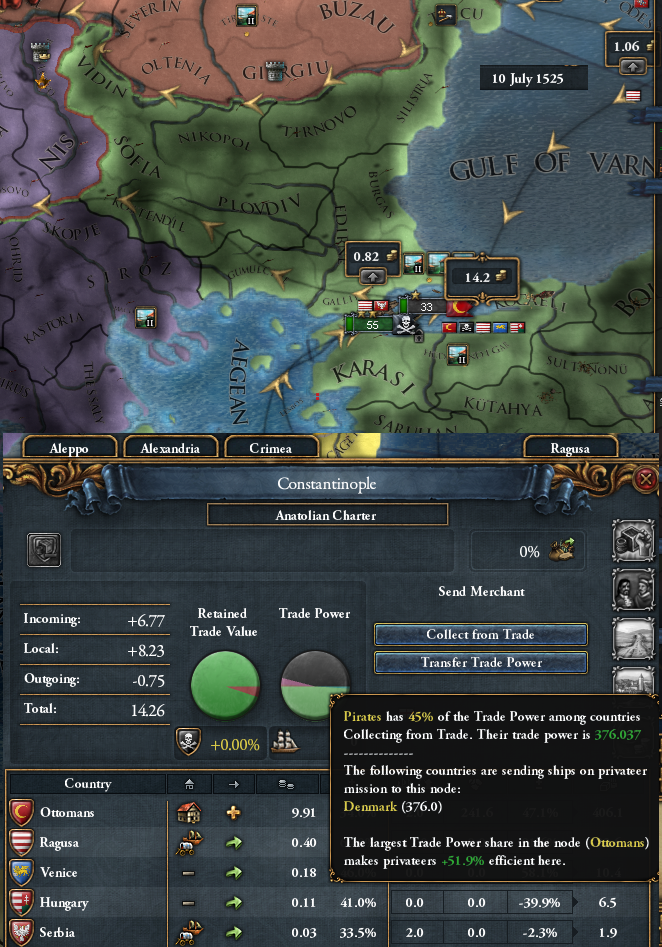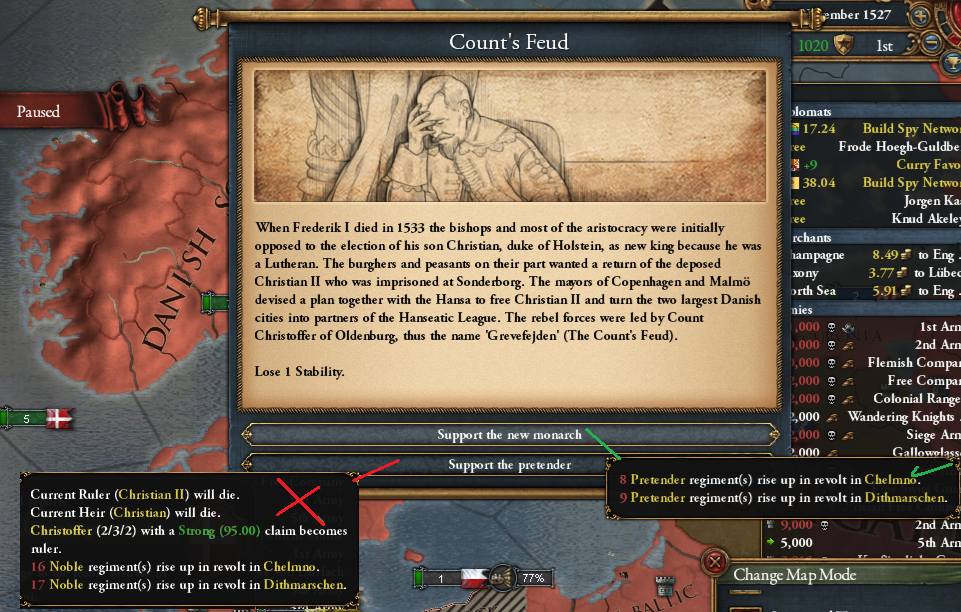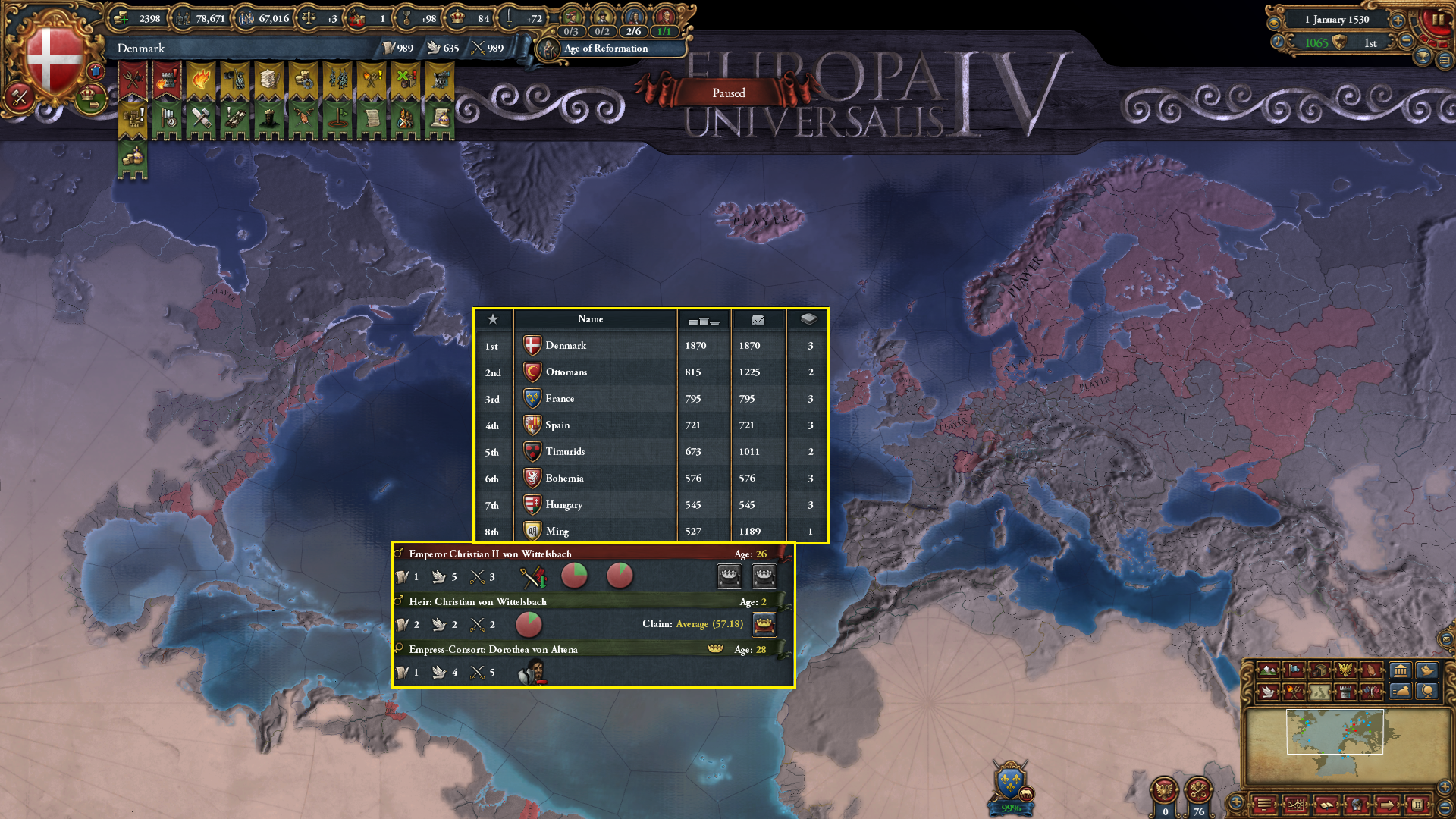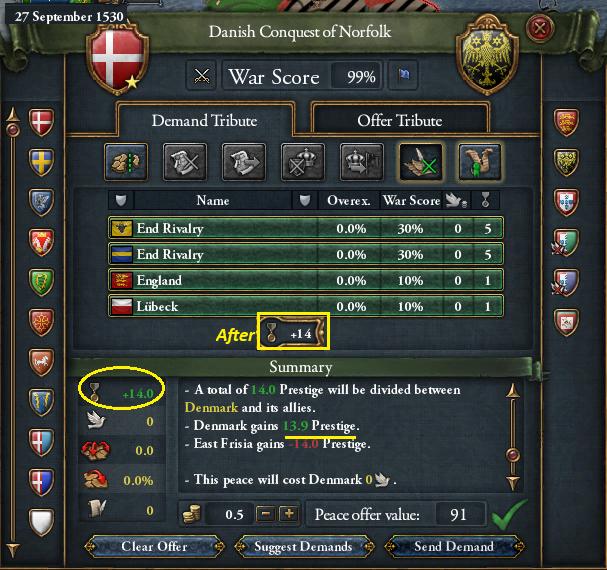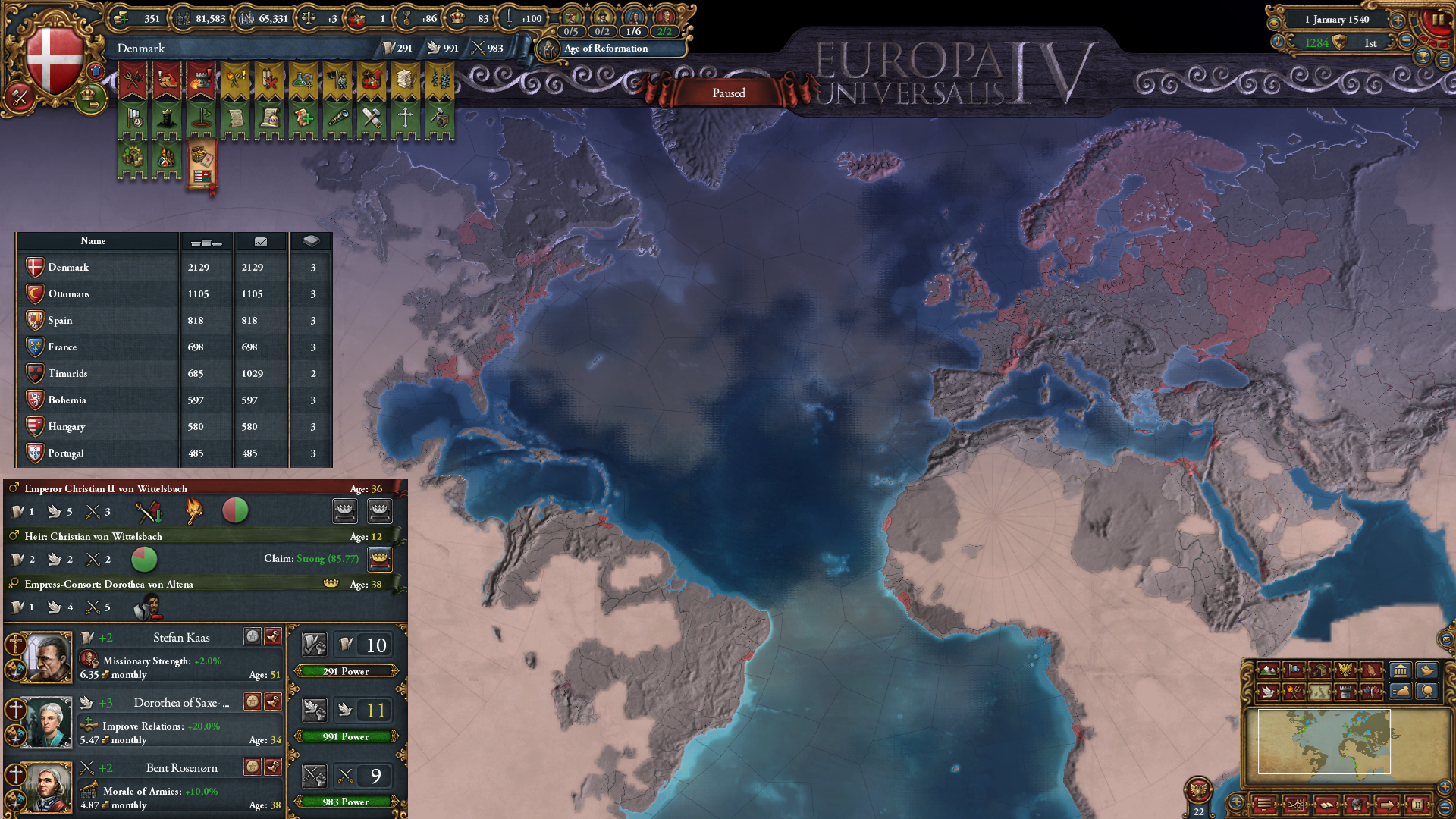Note: some screenshots have failed to upload. I will try to upload them again tomorrow .
Chapter 10: A Fervent Prayer for Tolerance and Good Relations (1530-1540)
Emperor Christian II spent New Year's Eve of 1530 in the Royal Chapel in Zeeland. This was in stark contrast to his grandfather, who typically celebrated the occasion in a drunken party among friends and mistresses . Instead, Christian II went into the chapel alone, taking with him a (translated) bible, some religious tracts written by the reformers in Warsaw and Ulm , and a note written by his diplomatic advisor.
The note explained why the Catholics of Europe looked askance at his grandfather installing a Wittelsbach as heir to the Spanish throne, and warned that if he were to repeat that feat, Denmark would generate a lot of animosity. But the note also gave him a way to avoid that and maintain good relations with his neighbors
[but see footnote].
Christian then looked at the writings of the Protestants of Ulm and their arguments in favor of their faith
Finally he looked at the recent writings of Reformers from Warsaw, who took a tolerant view of Religion and government, more in line with his personal leanings.
When he emerged in the morning from the Chapel, his advisors asked him how he spent the night. Our kind-hearted ruler's only reply was "I fervently prayed for tolerance and good relations among mankind".
He then went to the palace to address the peace treaty with France.
Although he was initially leaning towards giving Spain some provinces in Iberia. he changed his mind based on external advice ( h/t
@Steckie ) and after realizing that the Spanish had occupied the Ivory Coast province he wanted. So Spain got nothing, and instead the big winner was Toulouse who was released as a free nation. Also released was the Duchy of Bar based out of Verdun, which connected Gallia to the Low Countries , and was expected to agree to becoming a vassal. Denmark also took Calais, an important center of trade with Walloon culture that would be a permanent part of Denmark. And Paris was pillaged to grow Zeeland.
And the first important question after the peace treaty was whether Toulouse, fairly large but less than 100 development, would accept vassal status. And it was close .
But after hiring a Diplomat and with some nudging from a Papal Legate, the Toulousians agreed, barely, to become a subject of Denmark. Bar was much easier to convince, and joined Denmark's subject family soon after. Christian planned for both vassals to be annexed into Denmark in 10 years , and then have their lands transferred to Gallia. Although that plan was going to waste diplomatic resources, he felt it was better than direct annexation from France which would have generated a lot of aggressive expansion.
During those diplomatic maneuvers, Christian's prayer for good relations was answered when the English decided to split away from Catholicism and establish their own church.
Since Christian was about to attack England in any case, having them turn heretic meant his relations with the catholic powers would not worsen, and that he would not need to worry about a Catholic Defender of the Faith protecting England. But before he attacked England, he had to settle the Norwegian question, and based on unanimous advice from his corresponding advisors ( all my readers were in favor) , he transferred all the provinces in Norway to Sweden ( Iceland and the North Atlantic Islands were not adjacent to Sweden to allow a transfer). Since Sweden was very loyal, he did not concentrate development from Norway to Zeeland, feeling that a stronger subject was a better option ( too much development would have been lost in the transfer) .
And then he surprised his advisors by announcing that his night of special prayer
[ my unpausing for AAR ] had led him to decide that the tolerant Reformed faith was the best choice for Denmark, going against all his grandfather's previous proclamations that Catholicism was best . But he reassured his subjects that he would not impose the new faith by force, and made sure to issue edicts that preserved and even increased tolerance for Catholics and Protestants, even at the price of decreasing missionary strength. As a result of that tolerance, the religious unity of the Empire suffered only slightly, and there was never any danger of the disaster of religious turmoil taking place.

Of course, Christian wanted his realm to convert to the new faith, and he proclaimed himself Defender of the Reformed faith, and he hired an inquisitor to spread the faith faster. And in that endeavor, he was helped by the new Center of Reformation in Breda and an older one in Warsaw , conveniently close to the Prussian provinces. He assigned his missionaries to the former capitals first ( Bornholm, Sjaelland, Jorvik, Scarborough) and then methodically converted all the English provinces, followed by Danish, Estonian and Scanians provinces, leaving the Low Countries to the center of Reformation.
While the conversion did not cause problems from Religious Unity ( despite what his grandfather predicted) , it did cause a major problem with Prestige as the rulers of Europe looked down on his decision . And that was a problem because Prestige was important in getting rid of aggressive expansion, and also incase he he had the chance to claim a throne, he needed high prestige. So to recover this prestige,he made sure that Denmark did NOT call on her allies when he next declared war on England:
England was allied to Two Sicilies ( formerly Naples), Portugal and East Frisia. In England itself the war was fairly easy as Denmark quickly wiped out the English at Bedfordshire ( they were on their way to deal with religious rebels and got ambushed by the Danes). The war with Portugal spread to South America, where Denmark hired the Grand Company to attack Bahia, capital of Portuguese Brazil.
Unfortunately, as the Grand Company besieged Bahia, the Brazilians snuck up to Alcantara and illegally seized the colony by force.
Meanwhile in Europe, Danish armies besieged Lisboa and defeated a combined Sicilian and Portuguese force in Southern France/
But even without her allies, Denmark was still much stronger than the enemy alliance and eventually England's allies were peaced out one by one, starting with tiny Frisia early in the war
Frisia was forced to cancel treaties left and right, restoring some prestige to Emperor Christian II . Portugal came later, giving up Bahia, to atone for the stealth of Alcantara .
Although Denmark suffered some aggressive expansion penalty in the peace deal, Bahia was a good upgrade from Alcantara, being closer to Africa, but also containing the Salvador de Bahia monument, which inspired traders and settlers all over the world, and which Emperor Christian began to renovate as soon as the province was cored in 1534.
Two Sicilies exited the war in late 1532 for prestige and money ( the Emperor resited the urge to pillage Napoli, trying to manage Denmark's aggressive reputation). England followed soon after, but the peace was delayed till January 1 to minimize the potential coalition ( a process helped by the Emperor calling for a fervent focus on diplomacy every fall around October or November, to last till January or February) .
In the peace , Christian sought to maximize control of the Channel node while minimizing aggressive expansion . So he annexed the last two centers of trade in English Hands ( Gloucester and Hull) and just enough provinces to connect the Danish holdings on the island together. He then forced England to release Wales nd Gaeldom. He intended to vassalize and annex both nations by diplomatic means later on ( ideally after Bar and Toulouse have been annexed , but before the 15 year truce with England ended ) .
Our kind hearted ruler's efforts to manage aggressive expansion were rewarded by an alliance with his recent enemy Portugal.
THat made Denmark an ally of all the large nations of Catholic Europe, with the notable exception of France. Christian then sent a colonist to Beafada in Western Africa to being the process of advancing towards the Cape province, one of Denmark's national missions.
Now one of the effects of waiting till January first to make peace with England was that coincided with the exact end of the truce with Ottomans from the previous war ( when the first Christian also waited till New Year). And Christian II did not want to risk them starting a coalition, so war was immediately declared on the Sultan , citing the conquest of Mansur in the Pontic Steppe.
Denmakr called onher allies Spain and Bohemia for the war. Hungary was willing to join, but Christian feared they had designs on Constantinople and so he made sure he called them AFTER he secured the city .
The first engagement of the war was in Slavonia, in the Hungarian plain, where Bohemia and Danish troops combined to defeat the Turks with relative ease.
That victory and the sheer numerical superiority of the alliance over the Turks ( Denmark alone outnumbered them ) led to the fall of the enemy capital after a brief 41 day "siege" .
At that point Christian called on Hungary to enter the fray, while Danish troops moved into Anatolia and captured fort after fort .
While that war raged, Danish colonists were busy establishing a presence around the Atlantic coast of Africa. Once Arguin became a core of Denmark, colonial range reached modern day Angola, and a colonist was promptly sent to Luanda.
You see the Emperor was keen on advancing that project forward quickly, because Denmarks' Colonial Ambitions were fading away and her ability to explore terra incognita was not permanent. He estimated he had just about 20 years to round the Cape and explore as much of the Indian Ocean as possible.
Meanwhile back in the Middle East, the Ottoman empire's subject/ally Eyalet-i-Pers was forced out of the war in exchange for some prestige and pillaging, and also releasing the nation of Mushasha ( as a friendly Muslim nation, they will later be useful in sharing maps) .
And switching his attention between Africa and the Middle East, the Emperor was happy to see that the important Cape province was held not by a European nation, but by the African nation of Kilwa, who had no knowledge of Denmark ( it was much better to antagonize them than a European!!)
And being a good multi-tasker like his predecessor, he also found time to direct a quick war of prestige on tiny Muscovy
To maximize his prestige gains Christian forced Muscovy to abandon a large number of cores under Karelia, and he also forced them to become Reformed faith - one of the rare instances where he went against his tolerant nature. That satisfied one of the objectives of the Age of Reformation, so it was a good use of a small war.
Back in Africa, a new colony was started in Calabar, bringing the provinces in the Guinea region to three ( Arguin, Beafada, Calabar) and allowing the completion of the "Colonize the Gold Coast" mission which gave Denmark a permanent claim on the Cape Province and others in South Africa. This meant that as soon as Denmark had coring range to the Cape, war on Kilwa could be started. But that needed completion of the colony in Luanda first, so this will be covered in the next chapter ( or so I hope).
Meanwhile the war with Ottomans was reaching its end, as the enemy was almost completely occupied. And in fact the only delay in signing a peace was from waiting for a spy network to be constructed in Egypt ( formerly Mamluks) which was going to be Christian's next target. And as soon as he had enough spy power to claim Egyptian land, peace with Ottomans was made.

IN the peace , Constantinople itself was annexed. It was later given to Pontus after its development was concentrated to Zeeland. Also given to Pontus were the islands of Crete and Cyprus ( Greek culture) and provinces near Constantinople that would be helpful to have in a future war against the Turks. Although these were mostly Turkish culture, the Emperor expected Pontus to accept Turkish as they had free culture slots. As for Denmark herself, she took three provinces on the Asian mainland in the Aleppo node that bordered Egypt. These were promptly turned into the Prussian Levant Trade Company. And since they were outside Europe and not promoted to States, the Emperor did not feel obligated to address the unaccepted culture of their denizens
[I mention that in first post - culture rule only applies to Europe].
When the Emperor's entourage expressed their bewilderment at the choice of annexed provinces ( many expected him to annex land in Europe , or release Bulgaria for example) , he showed them this document.
It was the "Expand African Trade" mission document. And it required control of *six* trade nodes in and around Africa. Several of these were deep inland, or where controlled by his Iberian allies. But Aleppo and Alexandria, controlled by the Muslim powers of Ottomans and Egypt respectively, also counted. Another benefit of having a base in the Levant was the ability to "punch through" the Suez Isthmus to the Red Sea, and from there to the Indian Ocean to reach the famed Spice Islands (whether that path would end up being faster than rounding the Cape, only the future would tell).
And so with this explanation in hand, he then directed his diplomats to declare war on the surprised and outraged Egyptians, before they had a chance to organize a coalition
With a large number of troops positioned in Syria already, the invasion of Egypt was very quick. Al-Kerak, Tabuk, Cairo and Alexandria fell without any serious opposition.
Despite his aggressive wars on the Mohammedans, Christian personally was a tolerant person and he promised his future subjects that he would govern with a light hand, and would not seek to force convert them to Christianity .
It seems his prayers on New Year's Eve 1530 were very sincere. But as ruler of Denmark, he had to be firm with his enemies. And when it came to peace with the Egyptian ally Medina, he maximized his prestige gains and used that to parlay for maps from Mushasha ( who he previously freed from Eyalet-i-Pers).
And he also did not hesitate to cash in favors accumulated over time in Pest to install a Wittelsbach cousin as heir to the Hungarian ( and by extension Austrian) throne. However, this was still looked at as an aggressive action by the Europeans, which bewildered our Christian who then realized he misunderstood the note passed to him by the diplomat on New Year's eve 1530
[ see footnote].
But the reaction the European convinced him that he needed to continue working on improving relations and in that sense his choice to convert to the Reform faith was justified.
As to the war with Egypt, that wrapped up in mid 1538, with Denmark taking the strategic provinces of Sharqiya and Suez - where the isthmus is narrowest and where one day a canal can be built- as well as the important centers of trade and estuaries at the mouth of the Nile Delta.
That ensured that Denmark would have enough control of Alexandria trade node for purposes of the Africa mission . The aggressive land grab raised concerns about a Muslism coalition. But luckily for Denamrk most of the involved nations did not have knowledge of Denmark, so she had time to improve things. And the one nation that could have been a problem- the Timurids - soon declared their own war on Egypt.
THe Ottomans piled on soon after. Poor Egypt. But our Emperor used the Egyptians for one last act, and that was to steal maps of the Horn of Africa. And he promptly ordered exiled armies to move there in preparation for war against Kilwa in the next decade
Our Emperor wanted to spend the last year of the decade in relative rest, but his attention was grabbed by another unusual declaration of war, this time of Spain claiming restoration of Union on England
This war presented opportunities and challenges to Denmark. Spain still had a Wittlesbach heir, although he was 3 years older than her current ruler so may still die without ever sitting on the throne. BUt should Spain prevail on England, and then Denmark manage to claim the Spanish throne, she would have a potential double union on her hands ( although keeping England loyal will be difficult given the bad blood between them and Denmark). But also if England becomes Junior to Spain, all the English cores under Denmark will certainly sour relations between Spain and Denmark.
IN any case, that event brings us to the end of the chapter, and we will close with the dynastic map before the obligatory status map.

First we sadly note that the Wittelsbachs were no longer rulers in Pontus. When the last Wittlesbach there died without an heir, he was replaced by a local noble. And the blame for that unfortunate event lay squarely on Christian the Great , who was smitten by Dorothea of Pontus and accepted her family's marriage proposal instead of sending his own proposal. When her father died, the marriage relation ended and the Wittlesbachs could not get one of their own on the throne. Christian II would not make that mistake again, and any time a vassal proposed marriage, he sent his own proposal instead. Second, we note that Denmark has excellent diplomatic reputation and improved relations . And that Sweden is in no danger of being inhertied by Denmark in case of Christian's death. We also note that there are two other Christian von Wittlesbach in line for succession in Spain and Hungary. In both cases, however, the heirs are older than than the rulers, so it will take a lot of luck for Denmark to claim those thrones ( ruler has to die, and the Wittlesbach heir needs to ascend without a ready-made heir of their own ) .
Finally we close with some views of the internal workings of Denmark.
Income is great thanks to trade ( although our Emperor forgot to abolish war taxes and the fleet basing rights with Spain!!) .
Her trade is growing rapidly thanks to have new merchants from the two colonies and the Levan trade company. This income should mushroom in the coming decades as more ships are built and investments made into manufactories in the Textile provinces of the Channel and more merchants gained from Africa-based trade companies.
Trade is boosted by healthy mercantilism, mostly obtained via the Estates
footnote : I either misunderstood the Wiki or it is out-dated. I did get AE with Hungary and other Catholics when I installed an heir on Hungary. So that is a bummer and it negates one of the reasons I went Reformed. But still I think Reformed was the better option because of the 35% relations for AE reduction .



